Audi Q4 e-tron VS Toyota Prius
Audi Q4 e-tron
The Audi Q4 e-tron seamlessly combines sustainable driving with premium comfort, embodying the brand's commitment to electric mobility. Its sleek design and spacious interior create an inviting atmosphere, perfect for those who appreciate both style and practicality. With a focus on innovative technology, the Q4 e-tron offers a dynamic driving experience that appeals to modern drivers seeking eco-friendly alternatives.
more informationToyota Prius
The Toyota Prius stands as a pioneer in the realm of hybrid vehicles, offering an eco-friendly driving alternative with its innovative technology. Its aerodynamic design and comfortable interior make it a practical choice for those looking to reduce their carbon footprint without sacrificing style. Additionally, the Prius boasts a reputation for reliability and efficiency, contributing to its lasting popularity among environmentally conscious drivers.
more information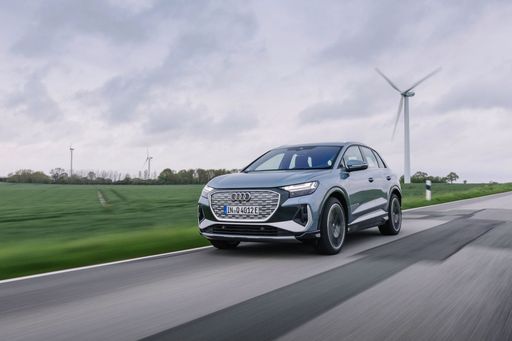 @ audi-mediacenter.com
@ audi-mediacenter.com
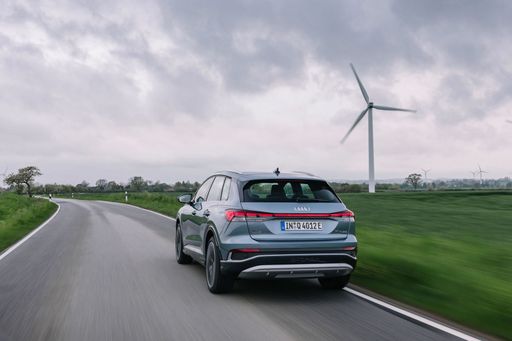 @ audi-mediacenter.com
@ audi-mediacenter.com
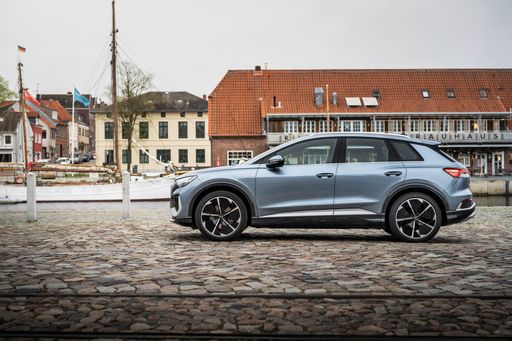 @ audi-mediacenter.com
@ audi-mediacenter.com
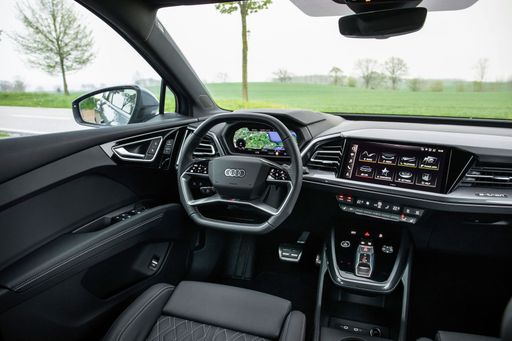 @ audi-mediacenter.com
@ audi-mediacenter.com
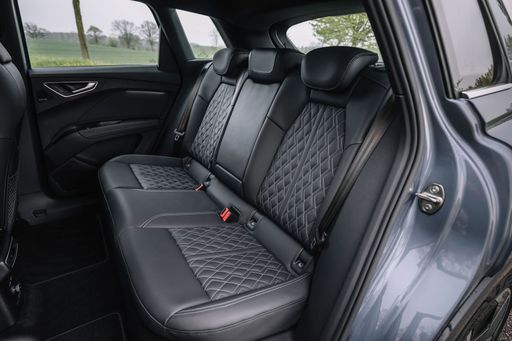 @ audi-mediacenter.com
@ audi-mediacenter.com
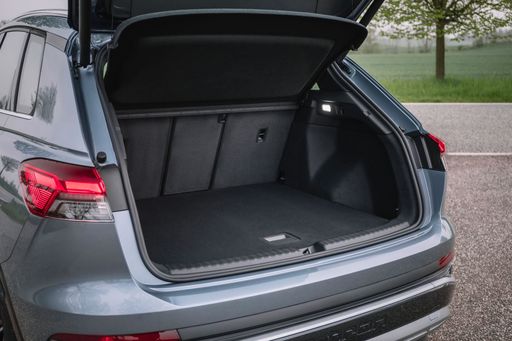 @ audi-mediacenter.com
@ audi-mediacenter.com
 @ Toyota
@ Toyota
 @ Toyota
@ Toyota
 @ Toyota
@ Toyota
 @ Toyota
@ Toyota
Costs and Consumption |
|
|---|---|
|
Price
about 39100 - 58800
£
|
Price
about 39400 - 45800
£
|
|
Consumption L/100km
-
|
Consumption L/100km
0.5 - 0.7
L
|
|
Consumption kWh/100km
15.9 - 17.4
kWh
|
Consumption kWh/100km
-
|
|
Electric Range
350 - 554
km
|
Electric Range
72 - 86
km
|
|
Battery Capacity
52 - 77
kWh
|
Battery Capacity
-
|
|
co2
0
g/km
|
co2
12 - 17
g/km
|
|
Fuel tank capacity
-
|
Fuel tank capacity
40
L
|
Dimensions and Body |
|
|
Body Type
SUV
|
Body Type
Hatchback
|
|
Seats
5
|
Seats
5
|
|
Doors
5
|
Doors
5
|
|
Curb weight
1990 - 2235
kg
|
Curb weight
1620 - 1630
kg
|
|
Trunk capacity
520 - 535
L
|
Trunk capacity
284
L
|
|
Length
4588
mm
|
Length
4599
mm
|
|
Width
1865
mm
|
Width
1782
mm
|
|
Height
1614 - 1632
mm
|
Height
1470
mm
|
|
Payload
510 - 515
kg
|
Payload
365 - 375
kg
|
Engine and Performance |
|
|
Engine Type
Electric
|
Engine Type
Plugin Hybrid
|
|
Transmission
Automatic
|
Transmission
Automatic
|
|
Transmission Detail
Reduction Gearbox
|
Transmission Detail
CVT
|
|
Drive Type
Rear-Wheel Drive, All-Wheel Drive
|
Drive Type
Front-Wheel Drive
|
|
Power HP
170 - 340
HP
|
Power HP
223
HP
|
|
Acceleration 0-100km/h
5.4 - 9
s
|
Acceleration 0-100km/h
6.8
s
|
|
Max Speed
160 - 180
km/h
|
Max Speed
177
km/h
|
|
Torque
310 - 679
Nm
|
Torque
-
|
|
Number of Cylinders
-
|
Number of Cylinders
4
|
|
Power kW
125 - 250
kW
|
Power kW
164
kW
|
|
Engine capacity
-
|
Engine capacity
1998
cm3
|
|
Top speed
160 - 180
km/h
|
Top speed
177
km/h
|
General |
|
|
Model Year
2023 - 2024
|
Model Year
2023
|
|
CO2 Efficiency Class
A
|
CO2 Efficiency Class
B
|
|
Brand
Audi
|
Brand
Toyota
|
Audi Q4 e-tron
Introducing the Audi Q4 e-tron: The Future of Electric Mobility
The Audi Q4 e-tron marks a significant leap forward in the world of electric vehicles, combining luxury, performance, and cutting-edge technology into one dynamic package. As part of Audi's e-tron family, this SUV not only offers a sustainable alternative to traditional fuels but does so with the unmistakable elegance and comfort that the brand is renowned for.
Engine and Performance: Power Meets Efficiency
The Q4 e-tron is available in various configurations, showcasing Audi's commitment to offering choices suited to different driving styles and needs. With power outputs ranging from 170 PS to 340 PS, the Q4 e-tron allows enthusiasts and casual drivers alike to enjoy a spirited driving experience.
One of the standout features of the Q4 e-tron is its efficient energy consumption. Models achieve consumption figures as low as 15.9 kWh/100 km, enabling impressive ranges of up to 554 km on a single charge. This makes the Q4 e-tron not only a competent urban commuter but also a capable vehicle for longer journeys. The acceleration from 0-100 km/h varies between 5.4 and 9 seconds, depending on the configuration, allowing drivers to enjoy a thrilling performance without compromising on efficiency.
Battery Technology: Powering the Future
Equipped with a battery capacity ranging from 52 kWh to 77 kWh, the Audi Q4 e-tron features impressive charging capabilities. The intelligent battery management system optimally uses the stored energy, balancing performance with efficiency. This innovative approach ensures that owners can maximise the electric range without the need for frequent recharges.
Innovative Interior and Technology
Inside the Audi Q4 e-tron, luxurious materials and modern design come together seamlessly. The spacious cabin is designed for five passengers, offering ample legroom and luggage space of 520 to 535 litres, making it practical for everyday use. The digital cockpit, complete with a high-resolution display, provides essential information at a glance, while the intuitive infotainment system seamlessly integrates with smartphones for an enhanced connectivity experience.
Sustainability and Driving Dynamics
Sustainability is at the core of the Audi Q4 e-tron's design. The vehicle not only produces zero emissions but also incorporates recycled materials in its manufacturing processes, showcasing Audi's commitment to eco-friendly production. Furthermore, with optional all-wheel drive capabilities available, the Q4 e-tron ensures excellent traction and stability, regardless of road conditions, making every drive enjoyable and secure.
Conclusion: A Symbol of Electric Elegance
The Audi Q4 e-tron epitomises the brand's drive towards a more sustainable future while maintaining the performance and luxury that customers expect. With its diverse range of configurations, advanced technology, and commitment to efficiency, the Q4 e-tron is not just another electric vehicle—it's a bold statement in automotive innovation. As we move forward, this vehicle is set to become a benchmark in the electric SUV segment, offering an exemplary blend of comfort, performance, and technology.
Toyota Prius
The All-New Toyota Prius: Revolutionising Efficiency and Performance
The Toyota Prius, a name synonymous with hybrid innovation, has once again shown why it remains at the forefront of eco-friendly automotive technology. The latest models have enhanced technical features and innovations, setting new standards for efficiency and driving experience.
Hybrid Performance: A Leap Forward
The latest Prius models employ a sophisticated 2.0 litre Plug-in Hybrid system that flawlessly melds petrol and electric power. With a power output of 223 PS, it propels the Prius with impressive dynamism, reaching 0-100 km/h in just 6.8 seconds. This performance-oriented aspect of the Prius does not compromise on efficiency, with an astonishing fuel consumption ranging from 0.5 to 0.7 L/100km.
Electric Range and Efficiency
One of the key highlights of the new Prius is its substantial electric-only range. Depending on the variant, it can travel between 72 to 86 km on electric power alone, making it an ideal choice for urban commutes where zero emissions are preferred. The hybrid system's CO2 emissions are remarkably low, between 12 and 17 g/km, contributing to its CO2 Efficiency Class B rating.
Engineering Excellence with CVT
The Prius is equipped with a state-of-the-art Continuously Variable Transmission (CVT), ensuring a smooth and efficient drive. This advanced transmission supports the front-wheel-drive layout, delivering power seamlessly and enhancing driving pleasure without sacrificing fuel economy.
Stylish Design and Comfort
Designed as a sleek five-door hatchback, the Prius offers a comfortable and spacious interior with seating for five passengers. It measures 4599 mm in length, 1782 mm in width, and 1470 mm in height, offering a practical balance of size and comfort. The boot space, while tailored for the hybrid battery, still provides a decent 284 litres of storage.
Cost Efficiency
The running costs of the Prius are competitive, with monthly expenses estimated between €1064 and €1188, and cost per kilometre ranging from 42.6 to 47.5 cents. Its efficient design results in a maximum speed of 177 km/h and a practical fuel tank size of 40 litres, ensuring less frequent stops on longer journeys.
Conclusion: The Prius Legacy Continues
The Toyota Prius continues to lead by example in the realm of hybrid technology. Combining impressive power with unmatched efficiency and a sophisticated driving experience, it is clear that the Prius remains a compelling choice for the environmentally conscious driver. Its innovative features and favourable cost metrics only bolster its appeal in the modern automotive landscape.
